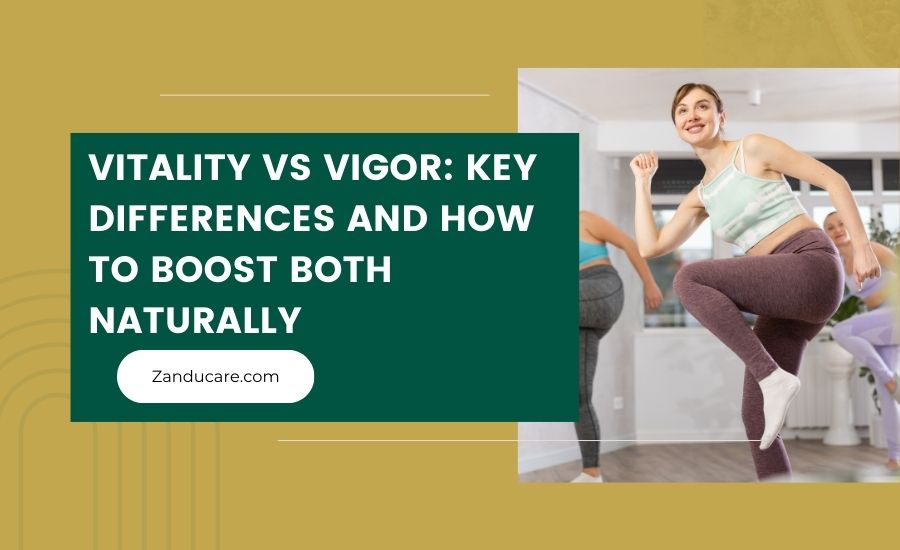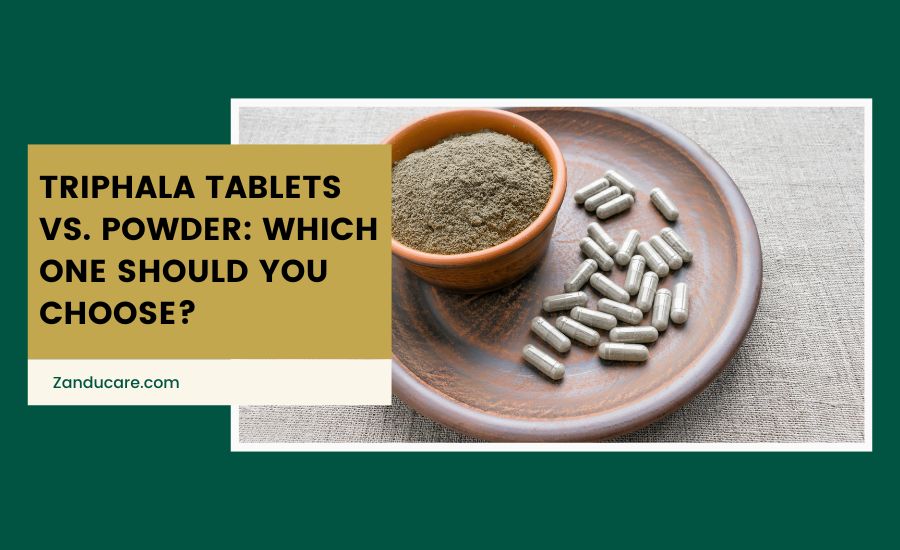
Vitality vs Vigor: Key Differences and How to Boost Both Naturally?
|
Key Insights:
|
In the pursuit of a healthy and fulfilling life, two concepts often come into focus: vitality and vigour. While sometimes used interchangeably, they have distinct meanings for well-being. Vitality represents overall energy levels and zest for life. It encompasses physical health, mental clarity, and emotional buoyancy.
Vigour focuses more narrowly on physical strength, stamina, and resilience. Boosting vitality involves holistic lifestyle choices like nutrition, sleep, stress management, and meaningful connections. Building vitality relies more on fitness, activity levels, and physical challenges. Pursuing both vitality and vitality in balance can help one create sustainable energy to thrive in all areas of life.
|
Did You Know:
|
What is Vitality?

Vitality refers to sustained energy levels without drastic dips. It represents resilience and a person's capacity to recover from stress. Vitality also encompasses inner balance, happiness, and enthusiasm for life.
People with high vitality often radiate positivity. They possess enduring energy reserves that fuel them through obstacles. Vitality is associated with:
-
Sustained Energy Levels: Maintaining consistent energy without feeling drained
-
Resilience: quickly rebounding after challenges
- Inner Wellness: fostering balance for happiness and zeal for living.
Vitality measures holistic well-being across physical, mental, and emotional realms. Cultivating vitality requires lifestyle choices that align with several facets of health, including nutrition, movement, mental wellness, and emotional and spiritual equilibrium. Vitality is known to offer access to deep energy reserves.
What is Vigor?
Vigour emphasises physical capabilities and attributes specifically. It represents muscular strength that enables easy completion of physical tasks. It also means possessing stamina for sustained effort without fatigue setting in quickly.
Vigour is characterised by physical energy that creates readiness for dynamic action and movement. People with high vigour usually excel in athletic activities, bounce back rapidly after exertion, and have a high degree of endurance.
Vigour is associated with qualities like:
- Muscular Strength: Muscular strength helps in performing physical feats with ease
- Stamina: People with high stamina can usually sustain prolonged exertion without tiring
- Physical Energy: It means dynamic preparedness for activity and motion.
Developing vigour requires fitness pursuits targeting strength, endurance, and robust energy levels, which fuel the body in motion. Vigor is known to build outward expressions of health and physical prowess.
Key Differences Between Vitality and Vigor
This section covers the key differences between vitality and vigour. Some of the notable differences between the two include the following:
|
Aspect |
Vitality |
Vigor |
|
Focus |
Inner energy and overall wellness |
Physical strength and endurance |
|
Manifestation |
Emotional, mental, and spiritual balance |
Physical robustness and stamina |
|
Measurement |
Quality of life and resilience |
Fitness levels and physical performance |
|
Enhancement |
Nutrition, mindfulness, and rest |
Exercise, strength training, and activity |
Though interconnected, vitality and vigour have distinct roles. Experts suggest that vitality fuels overall wellness and lays the energy groundwork for vigour’s physical exertion, further boosting vitality.
Achieving fitness goals and physical readiness can contribute significantly to life accomplishments and reinforce holistic health. They support each other while focusing strengths on different areas of mind-body equilibrium and performance.
How to Boost Vitality Naturally
Enhancing vitality requires a holistic approach to nurture the body, mind, and spirit. This section covers how one can boost vitality naturally:
-
Prioritise Nutrition: Eat a balanced diet of fruits, vegetables, whole grains, lean protein, and healthy fats. Incorporate energy-promoting superfoods like nuts, seeds, berries, and leafy greens. Stay hydrated by drinking adequate water daily.
- Improve Sleep Quality: Aim for 7-9 hours of sound sleep per night. Create a consistent bedtime routine by winding down, avoiding screens, and practising relaxation techniques. One can also consider natural sleep aids like chamomile tea or lavender oil.
- Manage Stress Effectively: To promote calmness, practice mindfulness through authentic techniques like meditation, yoga, or deep breathing. Take regular breaks to relax and recharge. Importantly, engage in hobbies that spark joy and reduce stress.
- Support Your Mental Health: Fostering positive relationships and social connections. Make time for creative activities that bring you joy. Seek professional help if anxiety or depression persists.
- Stay Physically Active: Consider including low-impact exercises like walking, swimming, or tai chi for sustained energy. Avoid overexertion, which can drain vitality. Incorporate movement through stretching during routine breaks.
Following a vitality-focused lifestyle requires balancing several facets of health in harmony. Nurturing nutrition, sound sleep, managing stress levels, mental health, and physical activity help one enhance energy reserves, resilience, and inner wellness. These are the pillars of high vitality. Start with small, sustainable changes to pave the way for more remarkable exuberance for living.
How to Boost Vigor Naturally

Building vigorous physical strength and stamina requires targeted training, proper fueling, and recovery. This section covers the top ways of boosting vigour naturally:
- Engage in Strength Training: Incorporate weightlifting and resistance exercises like squats, deadlifts, and push-ups into the daily routine. These compound movements are known to build overall muscle strength.
- Improve Cardiovascular Fitness: To build cardiovascular endurance, run, cycle, or swim. Experts recommend 150 minutes of moderate cardio activity per week. Consider incorporating high-intensity interval-based cardiovascular training based on professional recommendations.
- Fuel Your Body Appropriately: Consume protein-rich foods like meats, legumes, and dairy products to support muscle growth. One can also eat complex carbohydrates to sustain energy for activity. Try to stay hydrated with electrolyte or fluid-rich beverages during workouts.
- Optimise Recovery: Allow proper rest between intense workout sessions to prevent burnout. Use tools like foam rollers, massage, and stretching to ease muscle tension. Prioritise sleep to facilitate muscle repair.
- Stay Consistent: Create and follow a structured fitness plan. Gradually increase workout intensity and duration to progress continually. Track progress to stay motivated and ensure improvement. Developing vigour depends on training that can help one build muscular strength and cardiovascular endurance.
Fueling oneself with nutrient-dense whole foods can provide energy for physical activity without depleting energy. Allowing adequate recovery can save one from the harmful effects of overtraining.
A consistent progressive training plan focused on vigour can help one push the existing physical limits while avoiding burnout. Following these points, a template is provided for realising increased strength, stamina, and energy.
Vitality and Vigor: Synergising Both

While vitality and vigour have distinct focuses, they work synergistically for well-rounded health. Here’s how one can synergise them both:
- Adopt a Holistic Fitness Routine: Combining cardio, strength training, and mind-body practices like yoga or pilates can enhance overall physical vigour and vitality. Scheduling regular movement breaks is crucial to maintaining energy and preventing fatigue.
- Mind-Body Practices: Practices like tai chi or qigong can help one integrate physical activity with mindfulness to benefit both vigour and vitality.
- Balanced Nutrition: Consider including nutrient-dense foods to fuel vigorous activity while sustaining overall energy and resilience.
- Listen to Your Body: Pay attention to signs of overexertion and adjust accordingly. Balancing high-intensity workouts with restorative practices is crucial to ensuring longevity.
Carefully synthesising fitness, nutrition, and rest can help build physical prowess alongside inner strength and energy. Adopting a holistic approach can help cultivate complete well-being by keeping vitality and vigour in harmony.
Also, check:
Conclusion
Vitality and vigour are key to a healthy, active, fulfilling life. While vitality represents inner energy and wellness, vigour reflects outward physical strength and endurance. Understanding their differences and embracing natural methods to enhance both can help one create balance and thrive holistically.
Vitality comes from nurturing the body, mind, and spirit through nutrition, stress relief, or self-care. Vigorous fitness requires targeted training, fueling, and recovery. Making small, consistent additions to one’s routine that support vitality and vigour simultaneously will compound over time for complete empowerment to pursue an active, energetic, and meaningful life.
FAQs
1. What is the main difference between vitality and vigour?
Vitality focuses on inner energy and well-being, while vigour emphasises physical strength and endurance.
2. How can I naturally increase my vitality?
One can boost vitality through proper nutrition, quality sleep, stress management, and mindfulness practices like yoga or meditation.
3. What exercises are best for improving vigour?
Strength, aerobic, and interval training are highly effective for building physical vigour and stamina.
4. Can vitality and vigour be improved simultaneously?
Holistic approaches, such as balanced fitness routines, mind-body practices, and nutrient-rich diets, can help one enhance vitality and vigour.
5. Why is vitality important for overall health?
Vitality contributes to sustained energy, mental clarity, and emotional resilience. It helps one support a balanced and fulfilling life.
6. Are there specific foods that boost both vitality and vigour?
Foods like nuts, seeds, lean proteins, green leafy vegetables, and complex carbohydrates can help one naturally enhance vitality and vigour.
References:
- In the pursuit of a healthy and fulfilling life, two concepts often come into focus: vitality and vigour. While sometimes used interchangeably, they have distinct meanings for well-being. (https://dspace.uef.fi)
- Boosting vitality involves holistic lifestyle choices like nutrition, sleep, stress management, and meaningful connections.(https://pdf.sciencedirectassets.com)
- Developing vigour requires fitness pursuits targeting strength, endurance, and robust energy levels, which fuel the body in motion. (https://www.researchgate.net)
- Achieving fitness goals and physical readiness can contribute significantly to life accomplishments and reinforce holistic health (https://anubooks.com)





